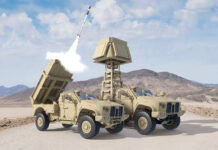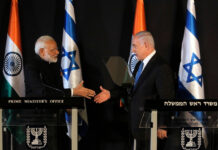 A senior Russian journalist who embarrassed the country’s military establishment with a series of exclusive stories has been found dead outside his apartment in mysterious circumstances. That in itself seems nothing extraordinary in Russia these days.
A senior Russian journalist who embarrassed the country’s military establishment with a series of exclusive stories has been found dead outside his apartment in mysterious circumstances. That in itself seems nothing extraordinary in Russia these days.
But the death of Ivan Safronov, 51, a former colonel in Russia’s eliten nuclear missile forces and later military correspondent for a major Russian newspaper caused eyebrows to raise among the Russian journalist community. Last December, Safronov already embarrassed the Kremlin authorities when he was the first to report the third consecutive launch failure of the new Bulava intercontinental ballistic missile, which President Vladimir Putin hailed as a basis of the nation’s nuclear might for years to come.
Safronov’s exclusive reports, probably based on inside information leaked by his former colleagues, had indeed infuriated the Russian authorities. According to his friends, Safronov was about to publish a new scoop on Kremlin’s illicit arms deal with Middle East rogue nations, deals, which would embarrass President Putin himself, following his recent high-profile visit to the region. Putin’s visit to US allies, Saudi Arabia, Jordan and Qatar last February was the first ever for any Russian or Soviet leader.
In the Saudi capital, Putin stunned the world when he offered to sell Saudi Arabia “peaceful” nuclear reactors and other sophisticated arms. While Arab leaders seemed to have praised Putin’s new Realpolitik in the region, the old Soviet model by embracing local leaders with anti-Western stance did raise some inquisitive eyebrows among the Arab monarchies. In fact, coming directly from Munich, Germany where Putin delivered his most bellicose anti-American speech yet, he further delineated a Russian Middle Eastern policy at odds with Washington’s, by trespassing boldly on the US sphere of influence in the Middle East.

Last October Anna Politkovskaya, an investigative reporter and a harsh critic of human rights abuses in Chechnya was shot dead last October at her apartment block in central Moscow. Sparking international protest, the murder happened exactly two days before she was due to publish an exposé of the Chechnyan Prime Minister.

But what has this visit to do with Ivan Safronov’s mysterious demise? Well, it seems, that the ex-colonel was becoming a painful thorn in the sideof the Kremlin and the Russian military brass. Already in January 2005, Safronov reported Russian secret plans to sell Iskander rockets to Syria, a story that provoked condemnation from the U.S. and Israel, which objected to the sale because the weapons could hit any part of Israel. The embarrassed Russian president confirmed Safranov’s report during a trip to Israel three months later, saying Russian producers were in talks to supply Iskander-E missiles to Syria, but assured that he had personally intervened to stop the sale. At that time Safronov had got away – however his personal dossier must have become top list with the internal security officials in the Kremlin.
But this time Safronov must have gone too far to challenge his mentors, which may have cost him his life. According to Kommersant editors, for whom the colonel had worked, Safronov met with unidentified people at an international arms show, IDEX 2007 in the United Arab Emirates last month and confirmed Russian plans to sell Su-30 fighter jets, sophisticated air defense missiles to Syria and among others the modern S-300V long range air defense missiles. The delivery to Iran would be made via neighboring Belarus to avoid being accused by the U.S. of arming rogue nations, especially breaking an embargo on Iran.
Analysts speculate that Safronov’s mere revelations were by themselves, insufficient to irk the Kremlin towards a “silent elimination contract”. However an angle, which for some reason was not pursued sofar, may indicate that the colonel’s ‘unpublished” story must have caused some stir when it touched on inside information concerning Putin’s latest Mid East tour. The Russian president already had caused quite a commotion in Washington when he bluntly tried to lure the Saudi and Jordanian Abdullah’s away from their traditional military sponsors. But what had vexed the two Monarchs severely, were persisting intelligence rumors over a new forthcoming huge arms deal with Syria and Iran, which for obvious reasons, Putin failed to elaborate in his visits.
Both countries, Saudi Arabia and Iran are already under most sensitive rivalry status, not only political but religious as well. The latest attempts by Tehran’s president to calm growing suspicion, especially by Riyadh, over Iran’s bid for a regional Shi’ite challenge, over Saudi Sunni traditional hegemony, must only have increased King Abdullah’s deep distrust in the Shi’ite move and the Russian as well. Another sophisticated arms deal with Russia, so shortly following Putin’s high profile “Sunni” Gambit and his unprecedented generous propositions might well place the Russian president’s new “Eastern Policy” in jeopardy. Thus, even a scoop, which in other times might have gone through with only marginal attention – could have completely ruffled feathers among the Kremlin and Russia’s military elite, perhaps even putting the blame on Vladimir Putin’s bungling authority, in thwarting his new Oriental initiative.
One must remember, that the Russian president is up for re-election in 2008 (coinciding with the US re-election campaign) and he can hardly afford a political disaster at this early stage. Thus, while no evidence has sofar been revealed over foul play in ex-colonel Safronov’s death, the finger prints of the highly professional Russian Federal Security Bureau (FSB), which is the successor agency to the notorious KGB are no doubt visible in this mysterious incident.
Without going into the sordid details, two major points seem to stand out unexplained: first, a former military officer would probably commit suicide by shooting himself and not by a mere jump out of a window to splash on the ground five stories below in a heap of sorry human flesh. It goes against the honor, especially in eastern countries like Russia, where the military trade still has its prestige, even somewhat flawed lately. Moreover having fallen from a staircase window on the fifth floor, two floors above his apartment, why did he leave a bag of oranges behind, which only adds to the peculiarity of the mysterious death. So, did anyone actually push Safronov out of the window? This is quite dubious: the colonel was a physically strong man and would have opposed such a threat to his life violently, moreover it would have taken several “agents” to do the job, during which a loud commotion would have stirred the neighbors, none of whom apparently heard anything. So it must have been a highly professional job carried out by top experts, fully experienced in such murky affairs, that would leave only unanswered questions behind, carefully shelved into secret coffers of the FSB.
In fact, there is already growing speculation over the involvement of Russian agents in silencing regime opponents, a traditional “trade” which has been preformed for decades and seems to have been revived lately, as silent opposition to Vladimir Putin’s autocratic rule is causing concern among the sofar dormant Russian elite. And these “incidents” happened not only in President Putin’s era.
In October 1994, during Boris Yelzin’s relatively political Glasnost and post-Perestroika era, a reporter, who seemed to have misunderstood the new “transparency” of the Press, made a specialty of investigating the rampant corruption in Yeltsin’s armed forces. dimitry Kholodov was killed in his office at Moskobsky Komsomolets building when he opened a package, that a “friendly” informant had sent him, which apparently contained clandestine evidence of military malfeasance and corruption. Braving severe retaliation by the Kremlin authorities, some courageous colleagues pointed the finger for Kholodov’s assassination on the Federal Counterintelligence Service and the Russian Military high Command, in particular, Colonel General Matvey Burlakov, former commander of the Western Group of Forces in Germany and then a deputy defense minister; to Defense Minister Pavel Grachov; and even President Boris Yeltsin himself. As usual, the investigation revealed nothing and the matter was quickly forgotten.
But forgetfulness seems hardly a current attribute in present Russia, especially in the Journalist community. In fact, Russia is among the most dangerous countries for journalists these days, plagued by attacks on reporters who seek to expose official corruption and other murky abuses. The problem culminated last October by the killing of Anna Politkovskaya, an investigative reporter and a harsh critic of human rights abuses in Chechnya. Her reporting had already stirred the wrath of Russia’s most powerful and unfettered institutions – the Kremlin, the Federal Security Service (FSB) and the GRU, the military intelligence. She was shot dead last October at her apartment block in central Moscow. Sparking international protest, the murder happened exactly two days before she was due to publish an exposé of the Chechnyan Prime Minister. The gun found near her apartment block in central Moscow was a 9mm Makarov, known as the weapon of choice for professional Russian hit men. An investigation could not find the culprit. The New York-based Committee to Protect Journalists said in January that no less than 13 Russian journalists had been murdered in unsolved contract-style killings since 2000. Is Russia heading back into the miserly shade of the Soviet era?

















